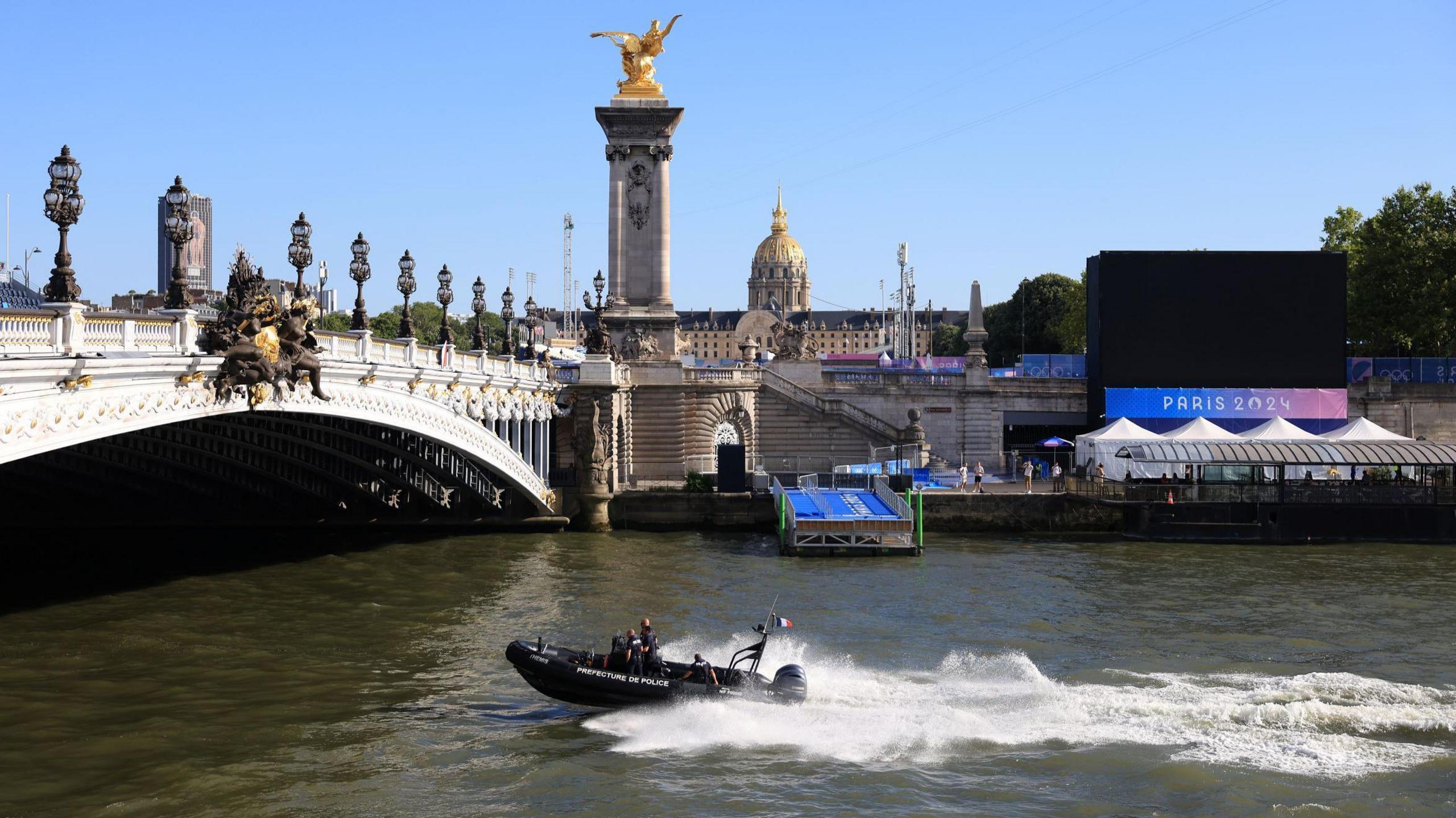'60% chance' triathlons take place on Wednesday

The water in the River Seine is being tested every day to make sure it is safe
- Published
Organisers say the men's and women's Olympic triathlons only have a 60% chance of going ahead on Wednesday after the men's event was postponed on Tuesday.
Tests of the River Seine in the early hours of Tuesday morning revealed the water was not clean enough for the race to take place.
It is now set to be held on Wednesday at 09:45 BST (10:45 local time), after the women's event, which is scheduled to start at 07:00 (08:00 local time).
Final tests of the water will be taken at 02:30 BST.
World Triathlon president Marisol Casado had previously said there was an 80% chance the men's triathlon would take place on Tuesday.
But after the race was postponed she explained "unfortunately it was the 20%" that had won out.
When asked what the chances were of Wednesday's triathlons happening, Casado told BBC Sport the odds were "60-40" in favour.
“We really want this to happen," said Casado, adding organisers thought the improvement in water quality would be "faster than it was".
"We were shocked this morning when we saw that it was not as fast as we wanted," she added.
The men's race had been due to start at 07:00 BST (08:00 local time) on Tuesday.
While Friday, 2 August remains a back-up date for both the men and women's races, organisers say the event could be contested as a duathlon - just the cycling and running legs - as a last resort.
Great Britain's Alex Yee is one of the favourites for gold in the men's race, while team-mate Beth Potter is the reigning women's world champion.
Key questions answered after triathlon postponement
- Published30 July 2024
Postponement is 'disrespectful'
Postponing the men's triathlon on the morning of the event was "disrespectful", according to one competitor.
Belgium's Marten van Riel said triathletes had been treated like "puppets in a puppet show".
"If the priority was the health of the athletes this event would have been moved to another location a long time ago," Van Riel wrote on Instagram.
The prospect of dropping the swimming leg from the triathlon has also been met with criticism.
"Duathlon is no triathlon and changing the day like that in the middle of the night is disrespectful to the years of preparation of the athletes and to all our fans that were going to watch live or on TV," said Van Riel.
"What an appearance for triathlon on the biggest scene."
British triathlete Vicky Holland, an Olympic bronze medallist in 2016, told BBC Sport organisers should have had an alternative venue ready to hold the swimming.
"A duathlon would be the worst-case scenario," said Holland.
"That would be a really disappointing outcome. It is disappointing that there wasn't another contingency in place, but a back-up venue feels like an obvious option."
Weather forecast is 'encouraging'
British Triathlon performance director Mike Cavendish said the postponement of the men's race was "clearly disappointing" but added: "We understand the organising committee's desire for the event to go ahead as a triathlon."
Tests are being carried out daily on the water quality in the Seine, which is also due to host the triathlon mixed relay on 5 August, the Olympic marathon swimming on 8 and 9 August, and the Para-triathlon event at the Paralympics, which start on 28 August.
Organisers said about 1.4bn euros (£1.2bn) had been spent on a regeneration project to make the Seine safe to swim in after a 100-year ban from doing so.
As recently as June this year, the level of E coli bacteria was 10 times the acceptable level imposed by sports federations.
Paris mayor Anne Hidalgo recently swam in the river to highlight the clean-up efforts which have been undertaken and, earlier this month, tests showed the river was clean enough for swimming.
However, heavy rain in Paris on Friday and Saturday has caused the water quality to decline.
Thundery showers are forecast for Wednesday morning, following predicted high temperatures of up to 35C on Tuesday.
‘It doesn’t look that bad’: Would you swim in the Seine?
- Attribution
- Published30 July 2024
Analysis
BBC News Paris correspondent Hugh Schofield
This dirty water story is getting to be an embarrassment for all involved - the Olympics organisers, the city of Paris and the French government.
We were led to believe the Seine would be ready for swimming by the time of the Games, thanks to a massive investment of 1.4bn euros.
Persistently negative test results in the past months were put down to rainy spring weather. That, plus the fact the massive underground holding reservoir near Austerlitz station - a key part of the solution - had yet to come on stream.
But now it is high summer and the Austerlitz reservoir is operating - and still the water is not clean enough.
Worse, it's been revealed that on the day city mayor Anne Hidalgo took her famous dip (17 July) pollution levels were too high for bathing. Her explanation for the swim is that authorisation decisions are based on previous days' results, which were positive.
It all begins to look like a massive exercise in finger-crossing - which is not how major sporting events are supposed to be run.
Which is a shame, because the big picture is that the River Seine is infinitely cleaner than it was 25 years ago. Most of the preparation for swimming has been achieved. The goal of opening the river for public bathing is within sight.
Just perhaps not in time for the Olympics.
Related topics
- Published10 August 2024

- Published26 July 2024

